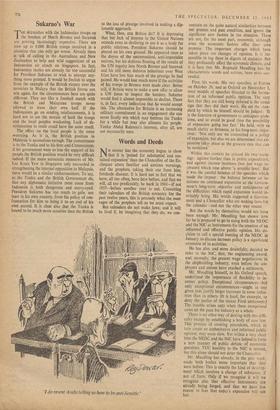Words and Deeds
No sooner has the economy begun to show that it is 'poised for substantial 'and sus- tained expansion' than the Chancellor of the Ex- chequer utters familiar and anxious warnings, and the prophets, taking their cue from him, forebode disaster. It is hard not to feel that we have, all too often, been here before, and that we will, all too predictably, be back in 1961—if not 1957—before another year is out. Consulting their calendars of the British economy for the past twelve years, this is precisely what the most eager of the prophets tell us we must expect.
But calendars do not make laws; and it will be fatal if, by imagining that they do, we con-
'I do resent Arabs telling us how to be anti-Semitic.'
centrate on the quite natural similarities between our present and past condition, and ignore the significant new factors in the situation. These are not, for the most part, economic, although even the economic factors offer their own promise. The important changes which have taken place are changes of opinion. It is im- possible to log these in digests of statistics. But they profoundly affect the economic climate, and it is here that Mr. Reginald Maudling has, by characteristic words and actions, been most suc- cessful.
First, his words. His two speeches, at Elstree on October 26, and at Oxford on November 1, were models of speeches directed to the forma- tion of an informed public opinion. The very fact that they are still being debated is the surest sign that they did their work. He set the stan- dard by which he himself should be judged : is the function of government to anticipate prob- lems, and to avoid in good time the possibility of expansion going too fast.' He held, with as much clarity as firmness, to his long-term objec- tives: `Not only are we 'committed to a policy of expansion, but also we are determined that ex- pansion takes place at the greatest rate that can be sustained.'
Within this context he uttered his two warn- ings: against'further rises in public expenditure, and against income increases (not just wage in- creases) which rose above 'a sensible level.' But it was the careful balance of the speeches which made the impact: ' the balance between an in- sistence on continued expansion as the Govern- ment's long-term objective and anticipation of the difficulties which rapid expansion would in- evitably bring. His words suggested a Go\ el n- ment 'and a Chancellor who are making laws for the calendar—and not the other way round.
But the words 'by themselves would not have been enough. 'Mr. Maudling has shown how far he is prepared to go in using both the NEDC and the NIC as instruments for the creation of an informed and effective public opinion. His de- cision to call a special meeting of the NEDC in January to discuss incomes policy is a significant extension of its activities.
He has also, and more doubtfully, decided to refer to the NIC, first, the engineering award, and, secondly, the present wage negotiations in the shipbuilding industry, even before the em- ployers and unions have reached a settlement.
Mr. Maudling himself, in his Oxford speech, underlined the importance of flexibility in in- comes policy. Exceptional circumstances—but only exceptional circumstances—might in any given year justify larger increases in some indus- tries than in others. (It is hard, for example, to deny the justice of the recent Ford settlement.) The trouble arises only when these exceptional cases set the pace for industry as a whole.
There is no other way of dealing with this diffi- culty except by establishing a body of case law. This process of creating precedents, which in turn create an authoritative and informed public opinion, may seem slow. Yet within a very short time the NEDC and the NIC have helped to form a new manner of public debate of economic questions. TUC hostility to the NIC is intense, but this alone should not deter the Chancellor.
Mr. Maudling has already, in the past week, made both bodies more important that they were before. This is exactly the kind of develop- ment which involves a change of substance, if not of form. Only if we recognise it will we recognise also that effective instruments are already being forged, and that we have less reason to fear that today's expansion will not last.






































 Previous page
Previous page